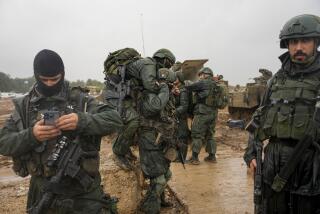In 2nd Ambush on Iraqi Road in 2 Days, 1 U.S. Soldier Dies
BAGHDAD â One American paratrooper was killed and six were wounded Monday when ambushers opened fire on their patrol just outside Fallouja, a hotbed of resistance to the U.S.-led occupation of Iraq. Two civilians also were killed in the attack, the military said.
Witnesses said about 30 soldiers from the Armyâs 82nd Airborne Division, accompanied by five Humvees, were on patrol when a homemade bomb exploded on the roadside. The bomb was followed by small-arms fire. In the exchange of fire, an Iraqi and a civilian Syrian truck driver hauling cement were killed.
âThe attackers also used rocket-propelled grenades,â Iraqi police Lt. Omar Ali said. âAfter the attack, the Americans launched a search operation and detained a number of civilians.â
Another ambush on the same highway leading into Fallouja, about 35 miles west of Baghdad, had been launched Sunday on a U.S. ammunition truck. No casualties were reported in that attack, which caused explosions and attracted a cheering crowd.
The unidentified soldier slain Monday was the 339th member of the American military to die since U.S. and British forces invaded Iraq on March 20.
Elsewhere in Iraq on Monday, soldiers from the Armyâs 4th Infantry Division beat back an ambush near the northern city of Hawija, killing three Iraqis.
U.S. officials said there were 15 attacks on Americans in the 24-hours ended at noon Monday. Daily attacks averaged 17 last week and 22 the week before.
It remains unclear who is behind the attacks on Americans in central and northern Iraq and to what extent the attacks are regionally coordinated. Many attribute the resistance to die-hard Saddam Hussein loyalists and non-Iraqi Arabs who have recently entered Iraq.
Though violence has continued in the so-called Sunni Triangle, the area west and north of Baghdad that is home to a large concentration of the minority Sunni Muslims who were favored under Husseinâs regime, the capital itself has been relatively calm after a spate of suicide bombings. There have been no major incidents since a bombing at the Turkish Embassy killed two and wounded eight Oct. 14.
Baghdad remains jittery, but its streets are congested with daytime traffic, shops and restaurants are open and Iraqis sit in sidewalk cafes into the evening hours. Huge concrete âblast wallsâ surround hotels, embassies and U.S. military compounds. On the streets, the American military presence seems to have lessened and patrols have become fewer in the last week.
Al Bawaba, an Arab news agency operating in the Persian Gulf states, reported Monday that a letter purportedly from Hussein had circulated in Tikrit, the former dictatorâs hometown. The letter, dated Oct. 9, urges Iraqis to attack Americans and anyone who supports them.
âVictory is near,â the letter says. âStrike with an iron fist any person ... who serves the hated invader.â
The comment apparently refers to the many Iraqis, including policemen, government employees and members of the Iraqi Governing Council, who have welcomed the Americans and become part of U.S.-led efforts to rebuild their country.
Meanwhile, two members of the Governing Council said Monday that the U.S.-appointed body had made little headway on the pressing issue of deciding how to select delegates to a constitutional convention. Choosing those delegates is the first step in a process that occupation authorities hope will lead to a new Iraqi government elected by the public -- considered a prerequisite for an American withdrawal from the country.
The Bush administration is hoping a constitution can be drafted within six months and elections held within a year. It is a timetable that even many American officials in Iraq admit is ambitious.
The U.N. Security Council recently passed a resolution calling on the Governing Council to reach by Dec. 15 a timeline for agreeing on a constitution and setting a path for national elections.
In separate interviews Monday, council members Samir Shakir Mahmoud and Dara Noureddine said only preliminary discussions had been held within the council since a preparatory committee for the constitutional convention submitted its first report to the council about three weeks ago.
âThere have been some discussions but only on the periphery,â Mahmoud said, noting that in recent days the council had concentrated heavily on the Iraq donors conference to be held in Madrid this week.
Noureddine, a former judge closely involved in the discussions, said he expected the council to take up the issue by early November.
âThere may be some delay, because itâs a very important decision and we prefer all members to be present,â he said.
Deciding who fills the positions on the constitutional drafting committee is the first of a number of potentially contentious debates on the countryâs future as its many ethnic groups jostle for advantage. The majority Shiite Muslim community, for example, wants delegates elected through a popular vote, while smaller groups, such as the ethnic Kurds, have argued for a more managed selection that would protect their minority voices.
More to Read
Sign up for Essential California
The most important California stories and recommendations in your inbox every morning.
You may occasionally receive promotional content from the Los Angeles Times.










